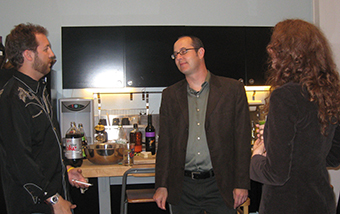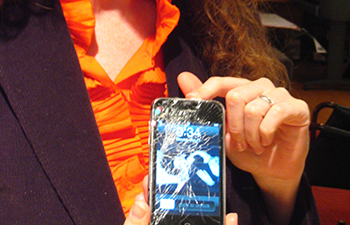Twitter has become a multi-headed phenomenon since MediaShift devoted a week to covering micro-blogging two years ago. Twitter is now established as a new form of communication, an early warning system for breaking news, and a startup company in San Francisco that has no discernable income. And with the power of Oprah, CNN and Ashton Kutcher, it has become a full-fledged mainstream phenomenon, like it or hate it.
So this month’s 5Across video roundtable discussion was dedicated to finding out more about Twitter from a group of power users who have built large followings on Twitter — whether in politics, photography, self-help, shopping or just cults of personality. The exchanges were sharp, and often the participants jumped in with questions of their own. Even after two years of Twitter use, we know it’s still an evolving medium and are not really sure whether it will outlast the social mediums that came before it, or flame out as another overhyped Internet fad.
Here’s the lineup of guests for this month’s video show (none of whom drank alcohol):
Amit Gupta is an entrepreneur who dropped out of college to start his first company, The Daily Jolt, during the first Internet bubble. He moved to New York to work with Seth Godin on ChangeThis. While in NYC, he camped out in Times Square overnight, organized tech conferences, lived in a commune for a month, and appeared on “The Today Show.” In 2006, he started Photojojo, a photography newsletter and online store, and you can learn more about him here. Follow him on Twitter @superamit.

Eric Jaye is the campaign manager for Gavin Newsom for Governor and is Newsom’s new media strategist. He is the founder and president of Storefront Political Media, a California-based consulting firm with local, state and national clientele. Jaye began his career as a newspaper reporter, but quickly found that he belonged on the other side of the story. Follow Gavin Newsom on Twitter @GavinNewsom.
Maggie Mason is the author of “No One Cares What You Had for Lunch: 100 Ideas for Your Blog,” publisher of Mighty Mighty Media, and a Twitter power user. She pioneered the shopping blog space with Mighty Goods, one of Time Magazine’s Top 50 Cool Sites, which was also named best shopping site by both Forbes and BusinessWeek. She has since launched a network of popular shopping sites that includes Mighty Haus and Mighty Junior. Follow her on Twitter @maggie.
Stephanie Quilao is a professional blogger at Everyday Tweet focused on healthy living, food, and the web for everyday use. She became Twitter renown because of a daily hydration tweet reminding people to drink water. Her best talent is translating Geek speak into Oprah speak showing people how the social web can help them live their best lives. Follow her on Twitter @skinnyjeans.
Christopher Sacca is a venture investor, private equity principal, company advisor, and entrepreneur managing a portfolio of over a dozen consumer web, mobile, and wireless technology start-ups through his holding company, Lowercase Capital. He is an investor in Twitter and works as a company advisor there. Previously, Chris served as head of special initiatives at Google, heading up the alternative access division. Most recently, Chris worked on President Barack Obama’s campaign as a telecommunications, media, and technology advisor. Follow him on Twitter @sacca.
As on the previous 5Across episodes, I’ve sliced up the show by topic below. Or if you’d like to watch the whole show, check it out here:
You can now subscribe to 5Across via iTunes; just follow this link that will open up your iTunes podcast directory.
Politics on Twitter
Eric explains how politicians can use Twitter to mobilize supporters, and Chris says that Twitter is about two-way conversations. Eric says that San Francisco Mayor Gavin Newsom writes most of his own tweets, and sometimes it’s slow going as he is dyslexic. Newsom announced his intention to run for California governor via Twitter.
Being Authentic on Twitter
Stephanie says it’s important to be yourself on Twitter even when you gain a lot of followers. Maggie says she doesn’t use her Twitter feed to promote her sites. Chris likes the way there is more inter-generational communication on Twitter, and Stephanie believes you can find out if someone’s faking who they are. Eric wonders why there aren’t as many flame wars on Twitter.
Will Twitter Change the World?
Chris says that he thinks Twitter the company should stay independent and not accept a buyout offer if it comes from Google. He thinks the company will change the world and make tons of money. Eric pushes back and says that’s a very bold statement for a new communication medium. Chris says Twitter has allowed people to communicate from any device anywhere. Maggie and Amit say it’s a democratized medium that anyone can use.
Twitter as Conversational Medium vs. Broadcasting
Amit thinks Twitter breaks down as a conversational medium when people have more than 25 followers, and is more of a broadcast medium. But Chris and Eric disagree and believes it’s possible for politicians and others to converse with some followers who might be representatives for groups of people. Amit says it’s an interesting way for companies to do customer service.
Twitter Trending Topics
Maggie says the Twitter “trending topics” — topics that many people are discussing — bring cultural awareness on current events. I wonder if people might manipulate the topics. Chris says that Twitter is a real-time search company, where you can find out about snow conditions, camera reviews and even get intelligence on startup companies. Stephanie says it’s the simplicity that makes Twitter so compelling.
Is Twitter a Fad?
Eric plays devil’s advocate, saying that Twitter can be faddish — it’s just a tool and people can use it for good or bad. Amit says Twitter is at a beautiful moment, when lots of great information is coming to him. I wonder if that moment might end soon, but Amit is confident that it’s just a filtering problem. Chris says that Twitter and Facebook gives you a continual stream about people’s lives you wouldn’t know about otherwise. Eric is still worried that Twitter will be corrupted.
Tweetups
Stephanie likes “tweetups” where you can meet your Twitter friends in person. Eric says politicians are using it for meetups as well. Stephanie says one diet blogger was faking it until they met her in person. Maggie is a bit worried about meeting up with strangers in public. Chris likes leaving “bread crumbs” or digital clues to surprises for his followers, including free massages in the Denver airport.
Credits
Mark Glaser, producer and host
Charlotte Buchen, camera
Julie Caine, audio
Location: Vega Project & Kennerly Architecture office space in San Francisco
Special thanks to: PBS and The Knight Foundation
Music by AJ the DJ
What do you think? Has Twitter changed the world — for the good? What can you add to the discussion? Share your thoughts in the comments below.
Mark Glaser is executive editor of MediaShift and Idea Lab. He also writes the bi-weekly OPA Intelligence Report email newsletter for the Online Publishers Association. He lives in San Francisco with his son Julian. You can follow him on Twitter @mediatwit.


Are all these things mentioned in praise of Twitter really relevant–I mean, really, really relevant, like bottled water or Viagra–to the life of Twitter users (or more precisely, Twitter message recipients)? It seems that unless one is trying to sell something, or be a celebrity or a politician–or, most likely, has an irrepressible urge to show off one’s latest exploits, there isn’t much point going gaga over it. It’s nothing but a remote megaphone to self-advertise at the expense of other people’s time.
Undoubtedly, there are some niche uses that go beyond self-advertisement, but such constructive use probably will be eclipsed by yet more news of “Man dies in a fiery clash while using text-messaging!”
As a tech-using educator, I have to agree with George’s comments. Twitter may have an envious adoption rate, and a gigantic legion of users, but until there’s a viable strategy for making money (and finding a way to deal with fail whales and all of the spammer), I really don’t see why everyone is getting so caught up in the hype of “you have to be using this!”
The amount of time that you have to invest into twitter to make it a valuable part of your daily routine, dramatically decreases from productive work time. I can’t justify sitting at my computer in the middle of my class, checking to see the latest “tweets” while I have a class of 25 students that need help, have questions, or just want permission to go to the bathroom. That’s not that Twitter doesn’t have its place. I used it 2 months ago for connecting and sharing with other attendees of a large state conference. It was fantastic, but I had the time to devote to it then, and in my daily routine I don’t.
If there’s anything that the rise and fall of Second Life taught us is that internet fads can and will crash no matter how much money is poured into a venture.
Check out: http://www.sfgate.com/cgi-bin/article.cgi?f=/c/a/2008/04/10/MNDS102IIM.DTL
Supervisor A Peskin: Gavin Newsom runs San Francisco the way the premier of China runs his country – secrecy, lies, misinformation, lack of transparency and manipulating the populace,” Peskin said. “He did it so China can report they had a great torch run.”
SF Gate reports: “It was an Olympic-sized fake-out..”
Mark,
Great job with this topic.
Love the insights and the video vignettes. Thanks for pushing into new territory when so many can barely be bothered to Retweet.
Big fan. Big fan.
Robb
Ben,
I agree that Twitter can be a time-suck. It is important to dip in and out of the stream and not get sucked in for too long. It’s all balancing out work time and Twitter time…
Robb,
Many thanks, glad you’re enjoying the videos. I’m trying to go deeper on subjects than others, but realize that shorter videos are more watchable online. I appreciate your words of encouragement!
Great program. The quality of discussion here is just incredible. Professional calm candid.
Something to do, I guess, while Waiting for Godot.
Cool video – knowing there are free massages in airports and random loose cash around…I might just start twitterin’
How will twitter fair when Goggle Wave comes out ?
plz check out this site.
I personally haven’t gotten into twitter (yet?).
And I really don’t think it will be a connection phenomenon like facebook is.
I actually do think it’s a cool idea but haven’t gotten into it because i really haven’t felt the pressure to. It is, indeed, a great way for people to follow certain famous people (for example, being the first (of many) to know when John Mayer’s new CD came out), or news sources, but does take up a ton of time.
I agree with George that it may just be more of a place to brag about what you’ve been up to – how long will something like this last? I think it’s definitely another way for people to be targeted by Niche Marketing depending on what they ‘tweet.’
I Always Follow Back!
I can’t understand English.
I am Japanese.
http://www.twitter.com/kizantei